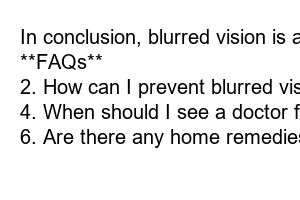시야가 흐려지는 현상
Have you ever experienced **blurred vision**? If so, you’re not alone. Blurred vision is a common issue that can affect people of all ages for a variety of reasons. From eye strain to more serious health conditions, it’s important to understand the causes and symptoms of blurred vision so you can seek the appropriate treatment.
**What is blurred vision?**
Blurred vision is a condition where objects appear fuzzy or out of focus, making it difficult to see clearly. It can affect one or both eyes and may be temporary or persistent. There are many potential causes of blurred vision, ranging from minor irritants to serious medical conditions.
**Causes of blurred vision**
Blurred vision can be caused by a number of factors, including eye fatigue, refractive errors (such as nearsightedness or farsightedness), cataracts, or even serious conditions like diabetes or multiple sclerosis. It’s important to consult an eye care professional to determine the underlying cause of your blurred vision.
**Symptoms of blurred vision**
Symptoms of blurred vision can vary depending on the cause. Some people may experience a gradual blurring of vision, while others may notice sudden changes in their eyesight. Other symptoms may include eye pain, headaches, or difficulty seeing at night. If you experience any of these symptoms, it’s important to seek medical attention promptly.
**Treatment options for blurred vision**
The treatment for blurred vision will depend on the underlying cause. In some cases, simple lifestyle changes such as getting more rest, taking breaks from screens, or wearing prescription glasses may improve your vision. However, if blurred vision is the result of a more serious condition, you may need to undergo more intensive treatment, such as surgery or medication.
**Preventing blurred vision**
There are several steps you can take to help prevent blurred vision, including getting regular eye exams, maintaining a healthy lifestyle, and protecting your eyes from harmful UV rays. Additionally, practicing good eye hygiene, such as taking breaks from screens and avoiding eye strain, can go a long way in preserving your vision.
**Conclusion**
In conclusion, blurred vision is a common issue that can affect people of all ages. By understanding the causes, symptoms, and treatment options for blurred vision, you can take proactive steps to protect your eyesight and maintain good vision for years to come. Remember to consult an eye care professional if you experience persistent or severe blurred vision.
**FAQs**
1. What are common causes of blurred vision?
2. How can I prevent blurred vision?
3. Can blurred vision be a sign of a serious health condition?
4. When should I see a doctor for blurred vision?
5. Is blurred vision reversible?
6. Are there any home remedies for blurred vision?

